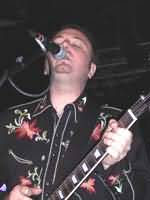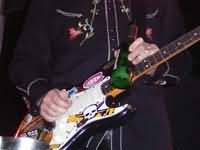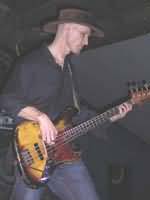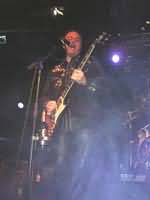


|
David Gogo: Ich mag es nicht, im Trio zu spielen, …
|
||
|
RockTimes: Zunächst vielen Dank dafür, dass du dir die Zeit für dieses Interview genommen hast, David.
David: Kein Problem! Ich rede gerne über mich. RockTimes: Für einen Monat warst du, hauptsächlich in Deutschland, mit Wishbone Ash auf Tour. Erzähle uns doch bitte etwas über deine Eindrücke und die Reaktionen der Zuschauer. Gibt es einen vergleichbaren Unterschied zwischen dem deutschen Publikum und den kanadischen oder amerikanischen Zuschauern?
David: Wishbone Ash sind sehr gute Musiker und nette Leute. Überall hatten wir tolle Reaktionen und, obwohl die Besucher für den Headliner anwesend waren, sieht es so aus, als hätten wir bei jeder Show neue Freunde dazu gewonnen. Das deutsche Publikum kennt sich in Sachen Musik sehr gut aus und es ist unheimlich pünktlich! Für die Shows war jeder zeitig da. Nicht so wie in Nordamerika, wo die Leute den Opening Act einfach übergehen. Obwohl wir vielbeschäftig waren, versuchte ich, wenn möglich, jede Stadt, in der wir waren, kennen zulernen. Ich habe eine Menge Bier getrunken und viele Schnitzel gegessen!  RockTimes: Auf dieser Tour hast du mit zwei großartigen Musikern aus den Niederlanden zusammen gespielt. Wie seid ihr in Kontakt gekommen? RockTimes: Auf dieser Tour hast du mit zwei großartigen Musikern aus den Niederlanden zusammen gespielt. Wie seid ihr in Kontakt gekommen?David: Den Drummer Ronald Oor kenne ich schon seit Jahren. Mit ihm spielte ich bereits vor acht Jahren auf meiner ersten Europa-Tournee in Holland und Belgien. Erst kürzlich lebte der Kontakt durch MySpace wieder auf und ich war froh über die Gelegenheit, wieder mit ihm spielen zu können. Aufgrund des Terminplans spielten wir mit zwei unterschiedlichen Bassisten, die mir beide von Ronald empfohlen wurden und die waren exzellent. RockTimes: Live hast du im Trio gespielt. War es deine Intension, ohne Keyboarder zu touren und wenn ja, warum?
David: Ich mag es nicht im Trio zu spielen, aber wegen des zur Verfügung stehenden Platzes auf der Bühne baten Wishbone Ash darum. Ich bin es gewohnt, mit einem Keyboarder zu arbeiten. Ich finde, mit einem Keyboarder muss ich nicht ständig soviel Gitarre spielen und ich mag es über den Keyboards zu solieren. Außerdem kann ich mich so auch viel einfacher auf meinen Gesang konzentrieren. Die Songs auf Vibe und "Skeleton Keys" beinhalten viel Keyboard. RockTimes: Lass uns über deine letzte Veröffentlichung hier in Europa reden: Jeff Healey spielt auf "She's Alright". Wie kam es zur Zusammenarbeit mit ihm?
David: Zunächst möchte ich zum Ausdruck bringen, wie schockiert und traurig ich war, als mir kürzlich der Tod von Jeff zu Ohren kam. Er war ein unglaubliches Talent und ein netter sowie lustiger Mann. Bis vor ein paar Jahren kannte ich ihn nicht sehr gut. Das änderte sich, als ich in seinem Club in Toronto spielte. Kurz danach lud er mich als Gast ein, um mit seiner Band dort zu spielen. Welch eine Nacht! Mit ihm auf der Bühne musst du als Gitarrist echt dein Bestes geben. Als ich im Studio saß, dachte ich, für "She's Alright" sollte ich ein Jeff Healey-ähnliches Solo spielen. Nachdem ich mich eine Stunde lang selber frustriert hatte, kam mir der Gedanke: »Warum nicht gleich Jeff holen?« Glücklicherweise stimmte er zu!  RockTimes: Eine weitere Überraschung war es, Tom Wilson von Blackie And The Rodeo Kings auf dem Album zu hören. Warum hast du ihn als Gast für "Love In The City" ausgesucht? RockTimes: Eine weitere Überraschung war es, Tom Wilson von Blackie And The Rodeo Kings auf dem Album zu hören. Warum hast du ihn als Gast für "Love In The City" ausgesucht?David: Tom und ich haben den Song zusammen geschrieben, als er unter anderem in Vancouver tourte. Tom und ich sind uns während der Jahre immer mal wieder über den Weg gelaufen und ich begegnete ihm unterwegs im Junkhouse. In jeder Beziehung ist er ein überlebensgroßer Charakter und ich habe es genossen, mit ihm zu arbeiten. Ich hoffe, wieder etwas mit ihm zu schreiben, wenn es unsere Terminpläne zulassen. Es ist schon ein wenig schwierig, weil er an der kanadischen Ostküste wohnt und ich an der Westküste. RockTimes: "Vibe" ist dein erstes Album mit ausschließlich von dir geschriebenen Liedern. Gab es einen bestimmten Grund, eine Platte ohne Cover-Songs zu machen?
David: Die Herausforderung dafür kam von meiner Plattenfirma. Ich hätte nichts darum gegeben, anstelle eines schwachen Originals einen guten Cover-Song auf dem Album zu haben. Für "Vibe" trifft das aber, so glaube ich, nicht zu. Ich denke, die Songs sind alle verdammt gut! Es bereitet mir Vergnügen, Songs anderer Leute zu reinterpretieren, insbesondere aus dem Blues-Genre. RockTimes: Stimmst du zu, wenn dein "Love In The City" mit den Rolling Stones verglichen wird?
David: Aber klar doch! Jedes Mal, wenn meine Musik an so großartige Gruppen wie die Stones erinnert, ist das eine Ehre. RockTimes: Nicht nur "Vibe" hast du mit Rick Salt produziert. Würdest du uns bitte etwas über ihn erzählen?
David: Für fast alle meine Alben habe ich mit Rick zusammen gearbeitet und als Produzenten und Techniker sind wir echt gewachsen. Im Studio bekommt er einen erstaunlichen Sound hin und er ist auch selbst Musiker. Seiner Meinung vertraue ich und er weiß, wie man Höchstleistungen aus mir heraus bekommt. Im Studio kommunizieren wir gut und mit ihm fühle ich mich in einer kreativen Atmosphäre einfach wohl. RockTimes: Beim Hören deiner Platten bekommt man den Eindruck, dass du nicht nur am traditionellen Blues hängst. Ist das richtig?
David: Für mich gibt es nur zweierlei Musik: gute oder schlechte! Ich liebe den Blues, allerdings möchte ich kein herkömmlicher Blues-Musiker sein, der nicht über die traditionalistischen Scheuklappen hinweg sehen kann. Ich liebe es, einen Song wie "Personal Jesus" von Depeche Mode herzunehmen und daraus eine Blues-Nummer zu machen. Das sagend, ist Son House mein absoluter Favorit. Dadurch, meine ich, kann man die Tür für neue Blues-Fans öffnen.  RockTimes: Hast du dir das Spielen der Gitarre selbst beigebracht? Gib es Blueser, die deine Musik beeinflusst haben? RockTimes: Hast du dir das Spielen der Gitarre selbst beigebracht? Gib es Blueser, die deine Musik beeinflusst haben?David: Als ich jung war, hatte ich Unterricht bei einem Kumpel namens Glen Foster. Im Grunde genommen hat er mir gezeigt, wie ich autodidaktisch lerne. Im Wesentlichen habe ich es mir selber beigebracht, aber sich ein Album anzuhören ist vergleichbar mit einem Student, der ein Buch durcharbeitet. Mein Weg geht mehr über das Gefühl als die Technik. Bezogen auf Einstellung und Anschlag war wohl Albert Collins mein größter Einfluss. RockTimes: Welche Pläne hast du für die Zukunft?
David: Nächstes Jahr werde ich überall in Europa und Nordamerika spielen und im Winter fange ich an für ein neues Album zu schreiben. Interessierte können meine Webseite besuchen, um heraus zu finden, wo und wann ich spiele. Zuhause werde ich mir einige Zeit nehmen, um zu schreiben und gute Ideen für die neue Veröffentlichung zu sammeln. RockTimes: Nochmals Danke für das Beantworten der Fragen, David. Und wir hoffen dich bald wieder in Deutschland zu sehen.
David: Keine Bange, das wirst du! Wir danken Moritz von Gordeon Music Promotion, der uns das Interview ermöglicht hat.
RockTimes: First of all, thank you for taking your time for this interview, David.
David: No problem! I love talking about me. RockTimes: For a month you toured with Wishbone Ash mainly in Germany. Please tell us about your impressions and the response of the audience. Is there a difference between German compared to the Canadian or American audience?
David: Wishbone Ash are very good musicians and nice people. We seem to get a really good response everywhere we played despite the fact that the audience was there for the headliner. We seem to make new fans at every show. The German audience seems to be very knowledgeable about music and they're very prompt! Everyone showed up in time for our performance unlike North America where people sometimes skip the opening act. As busy as we were, I tried to check out every city that we were in if at all possible. I drank a lot of beer and ate a lot of schnitzel! RockTimes: On this tour you played with two great musicians from the Netherlands. How did you get in contact with them?
David: Ronald Oor, the drummer, I have known for many years. I played with him in Holland and Belgium about eight years ago when I first toured Europe. I recently got back in touch with him through MySpace and was glad to have the opportunity to work with him again. Because of scheduling, we used two different bass players for the two legs of the tour. They were recommended by Ronald and both were excellent. RockTimes: Live you play as a trio. Was it your intention to go on tour without a keyboarder and if so, why?
David: I do not like playing as a trio but Wishbone Ash requested that we do so because of the space available on stage. I've become accustomed to working with a keyboard player. I find I don't have to be busy playing guitar all the time and I like the textures that the keyboards provide me to solo on top of. I can also concentrate on singing a lot easier this way. Hopefully, when I come back, it will be with a keyboard player. The songs on my albums Vibe and "Skeleton Key" have a lot of keys.  RockTimes: Let's talk about your latest release here in Europe: Vibe features Jeff Healey on "She's Alright". How did it come to the co-operation with him? RockTimes: Let's talk about your latest release here in Europe: Vibe features Jeff Healey on "She's Alright". How did it come to the co-operation with him?David: First of all, let me say how shocked and saddened I was to learn of Jeff's passing recently. He was an amazing talent and a very nice and funny man. I didn't know him very well until a couple of years ago when I played his club in Toronto. Soon after I played there, he invited me to be a guest with him and his band. What a night! You have to be at your best as a guitar player to share the stage with someone like that. On "She's Alright", I found myself in the studio thinking that I should play a Jeff Healey-type solo. After frustrating myself for an hour, I thought, "Why not just get Jeff?" Luckily, he agreed! RockTimes: Also a surprise was to hear Tom Wilson from Blackie And The Rodeo Kings. Why did you choose him as guest for "Love In The City"?
David: Tom and I wrote the song together when he was in Vancouver touring. Tom is someone I've known off and on over the years and I used to run into him on the road back when he was in Junkhouse. He is a larger-than-life character in every way and I enjoy working with him very much. I hope to write with him again if our schedules permit. It's difficult because he lives on the East Coast of Canada and I live on the West Coast. RockTimes: Vibe is your first record with all songs written by you. Was there a certain reason to do an album without cover-songs?
David: It was a challenge from my record company. I didn't want to sacrifice having a song on the album that was a good cover in exchange for a weak original. I don't think this is the case on "Vibe". I think all the songs are pretty damn good! I do enjoy re-interpreting other people's song, especially in the blues genre. RockTimes: Is it ok for you when your "Love In The City" is compared with the Rolling Stones?
David: Hell yeah! Anytime that your music brings to mind a group as great as the Stones, it's an honour. RockTimes: You not only produced "Vibe" together with Rick Salt. Could you please tell us about him?
David: I've worked with Rick on most of my albums and I think we've grown a lot as producers and engineers. He gets an amazing sound in the studio and he's also an accomplished musician himself. I trust his opinions and he knows how to get the best performance out of me. We communicate well in the studio and he's someone I feel very comfortable with in a creative environment.  RockTimes: By listening to your records one gets the impression that you not only stick to traditional Blues. Is that right? RockTimes: By listening to your records one gets the impression that you not only stick to traditional Blues. Is that right?David: To me there's only two kinds of music: good and bad. I love the blues but I don't want to be a paint-by-numbers blues artist who can't see beyond the blinders of traditionalists. I love the fact that you can take a song, like "Personal Jesus", by Depeche Mode and make it a blues number. That being said, Son House, is one of my favourite, all-time artists. I think that this attitude opens up the doors to bring new fans to the blues. RockTimes: Are you a self-educated guitarist? Are there Blues musicians who have influenced your music?
David: When I was young, I took lessons from a fellow named Glen Foster. He basically taught me how to teach myself. I guess I am essentially self-taught but listening to albums is the same as studying a book would be for a student. I go more by feel than strict technique. Albert Collins was probably my biggest influence in terms of attitude and attack. RockTimes: What are your plans for the future?
David: I'll be playing all over Europe and North America in the following year and then I'll start writing for a new album in the winter. People can go to my website, www.davidgogo.com, to find out where and when I'm playing. I'm looking foward to getting some time at home to write and come up with some good ideas for a new release. RockTimes: Thank you once again for answering the questions, David. And we hope to see you back in Germany soon.
David: Don't worry, you will! Thanks to Moritz from Gordeon Music Promotion, who has set up this interview.
Externe Links:
|


